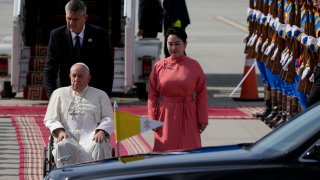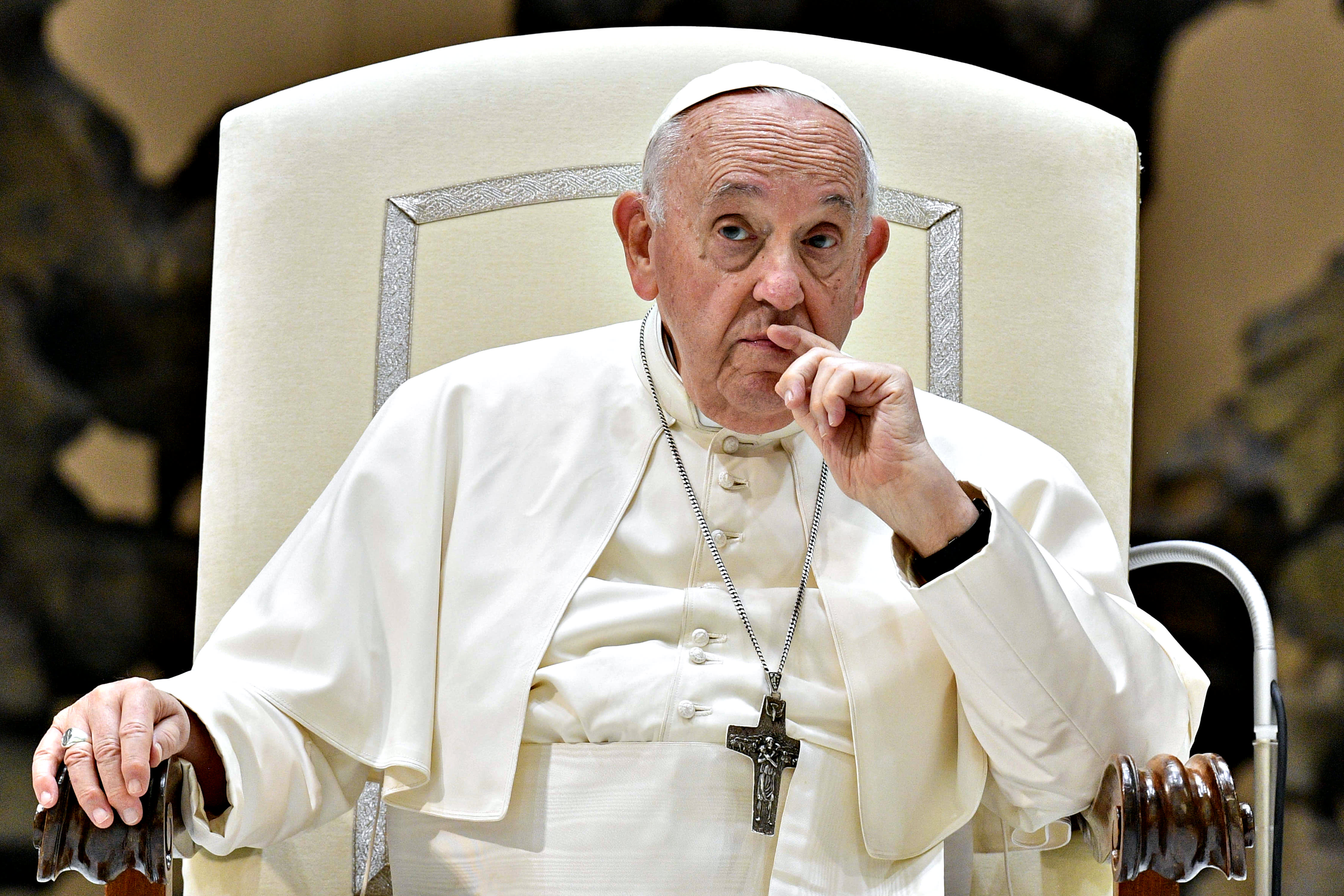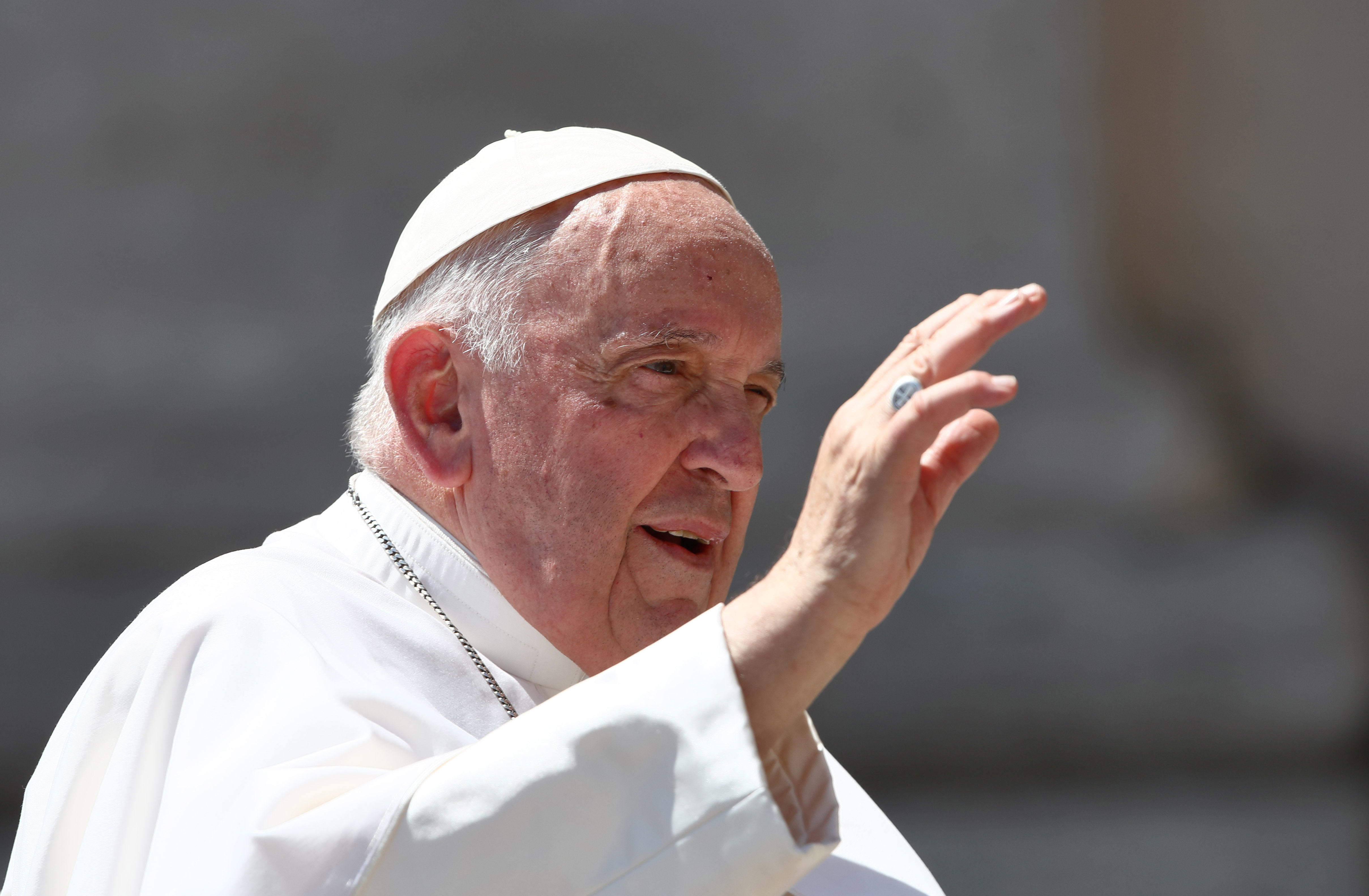
Pope Francis arrived in Mongolia on Friday morning to encourage one of the world’s smallest and newest Catholic communities.
It's the first time a pope has visited the landlocked Asian country and comes at a time when the Vatican’s relations with Mongolia’s two powerful neighbors, Russia and China, are once again strained.
Francis arrived in the Mongolian capital Ulaanbaatar after an overnight flight passing through Chinese airspace, affording the pontiff a rare opportunity to send a note of greetings to President Xi Jinping. Vatican protocol calls for the pope to send such greetings whenever he flies over a foreign country.
In his message to Xi, Francis expressed “greetings of good wishes to your excellency and the people of China.”
“Assuring you of my prayers for the wellbeing of the nation, I invoke upon all of you the divine blessings of unity and peace,” Francis said.
Despite strains in the relationship, Chinese Foreign Ministry spokesperson Wang Wenbin said the greeting showed “friendliness and goodwill.”
"China is willing to continue to walk in the same direction with the Vatican, conduct constructive dialogues, enhance understanding, accumulate mutual trust, and promote the process of improving the relationship of the two sides,” Wang said at a daily briefing.
Upon arrival, Francis, who uses a wheelchair, was met on the tarmac by helmeted honor guards along with Mongolia's foreign minister and was offered a taste of dried yoghurt from a woman in traditional dress, in a sign of welcome. He made no public comments. Along with priests and others gathered on the tarmac, several dozen watched his arrival from the airport terminal.
Speaking to reporters en route to Mongolia late Thursday, Francis said he was looking forward to visiting a country that has just a few people, but with a culture that you need your senses to understand.
Get a weekly recap of the latest San Francisco Bay Area housing news. >Sign up for NBC Bay Area’s Housing Deconstructed newsletter.
“There are only a few inhabitants — a small people, but a big culture,” he said aboard the ITA charter plane. “I think it will do us good to try to understand this long, big silence, understand what it means but not intellectually, but with senses.” He added: “Mongolia, you understand with your senses.”
On tap are official meetings with the Mongolian president and prime minister and a speech before Mongolian government, cultural and business leaders, followed by Francis’ first encounter with the bishops, priests and nuns who form the backbone of a tiny Catholic community of 1,450 that has only been in existence for a generation.
While Christianity has been present in the region for hundreds of years, the Catholic Church has only had a sanctioned presence in Mongolia since 1992, after the country shrugged off its Soviet-allied communist government and enshrined religious freedom in its constitution.
The Holy See and Mongolia have had diplomatic relations ever since, and a handful of missionary religious orders including Mother Teresa’s Missionaries of Charity have nurtured the tiny community through its first three decades of life.
Four Missionaries of Charity sisters — Jeanne Francoise from Rwanda; Chanmi from South Korea; Viera from Slovakia and Suder from India — run a nursing home on the northern outskirts of Ulaanbaatar with a capacity of 30 beds. There, they provide care for elderly people with mental or physical disabilities, or who are homeless, undocumented, or otherwise ostracized by their families.
Sister Jeanne Francoise said it was an honor that Francis was coming to Mongolia, saying she had seen him once before when she was living in Rome but that it was never as “close” as it would be in Mongolia.
Francis has long praised the work of missionaries and has tried to reinvigorate the missionary focus of the church at large by visiting them and encouraging their work. One of his first events in Mongolia is to preside over an encounter with missionaries Saturday afternoon at the capital’s St. Peter and Paul cathedral, and he ends his visit by inaugurating a new church-run charity house to tend to Mongolia’s poorest.
“I want people to know that the Catholic religion, the Catholic Church, and Catholic believers also exist in Mongolia,” the Rev. Sanjaajav Tserenkhand, a Mongolian priest, said outside the cathedral. He said he hoped that Francis’ visit would also show Mongolians that Christianity isn’t a “foreign religion,” but is also rooted in the country.
The Argentine pontiff has long prioritized visiting Catholic communities in what he calls the peripheries, staying away from the global centers of Catholicism to minister instead to small churches where Catholics are often a minority. He has made cardinals out of their leaders to show the universal reach of the 1.3-billion strong Catholic Church, including the head of the Mongolian church, Cardinal Giorgio Marengo.
“His heart burns with love for the universal church, and especially the church where she lives in a minority context,” Marengo told journalists during a recent visit to Rome. “And that is the wonderful meaning of his coming all the way to Mongolia.”
The other main focus of Francis’ four-day visit is to highlight Mongolia’s long tradition of interfaith coexistence. The Mongol Empire under its famed founder Genghis Khan was known for tolerating people of different faiths among those it conquered, and Francis will likely emphasize that tradition when he presides over an interfaith meeting Sunday.
Invited are Mongolian Buddhists, who are the majority in the nation of 3.3 million, as well as Jewish, Muslim and Shinto representatives and members of Christian churches that have established a presence in Mongolia in the last 30 years, including the Russian Orthodox Church.
That encounter could enable Francis to once again offer greetings to the Moscow patriarchate, which has strongly supported the Kremlin’s war in Ukraine. Francis has tried to steer a diplomatic tightrope in not antagonizing Moscow, consistent with the Vatican’s tradition of diplomatic neutrality in conflicts.
Days before his visit, he sparked outrage in Ukraine over his praise of Russia’s imperial past, comments that the Vatican insisted were by no means an endorsement of Moscow’s current war of aggression in Ukraine.
While the Vatican has insisted Francis is going to Mongolia — not China or Russia — the China question will be ever-present: A group of Chinese Catholics, as well as Russian Catholics, are expected to attend Francis’ Mass on Sunday in the Steppe Arena, but Beijing’s crackdown on religious minorities remains the backdrop to the trip.
In addition, China’s opposition to the Dalai Lama could come to the fore as Mongolian Buddhism is closely tied to Tibet’s strain and traditionally reveres the Dalai Lama. Francis has made a hallmark of meeting with religious leaders from around the world, but he has so far refrained from meeting the exiled Tibetan Buddhist leader, for fear of antagonizing Beijing.
Communist Party leader Xi has demanded that Catholicism and all other religions adhere strictly to party directives and undergo “Sinicization.” In the vast Xinjiang region, that has led to the demolition of an unknown number of mosques, but in most cases it has meant the removal of domes, minarets and exterior crosses from churches.
At the same time, Xi has shown no more desire to reconcile with the Vatican than his predecessors, while his administration continues to insist the Holy See cut all ties with Taiwan, the self-governing island democracy China claims as its own territory.
The Vatican and China did sign an accord in 2018 over the thorny issue of bishop nominations, but Beijing has violated it. Most recently Francis was forced to accept the unilateral appointment of a new bishop of Shanghai, whose predecessor disappeared into a monastery almost immediately after announcing his withdrawal from the party-controlled Patriotic Catholic Association.
That said, Hong Kong’s newly appointed Bishop Stephen Sau-yan Chow visited Beijing in April, the first visit to the Chinese capital by the city’s bishop in nearly three decades.
Chow, who is to be made a cardinal by Francis in September, said he invited the state-appointed archbishop of Beijing Joseph Li to visit Hong Kong in a symbolic gesture that experts said could strengthen the fragile relationship between China and the Vatican.
___
Associated Press religion coverage receives support through the AP’s collaboration with The Conversation US, with funding from Lilly Endowment Inc. The AP is solely responsible for this content.



